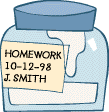

|
 We all know them. They come in on Monday morning and proudly announce they've done 15 hours study over the weekend. They intend giving up eating and
sleeping in the run-up to the Leaving. They're called Olympic flames (because they never go out). Fortunately, you don't have to become a recluse to
study efficiently. It's abou quality as much as quantity.
We all know them. They come in on Monday morning and proudly announce they've done 15 hours study over the weekend. They intend giving up eating and
sleeping in the run-up to the Leaving. They're called Olympic flames (because they never go out). Fortunately, you don't have to become a recluse to
study efficiently. It's abou quality as much as quantity.

Study is a matter of personal choice - whatever works for you. It's there to help you revise and remember. Just staring at a book for 2 hours is unlikely to help much - you should really be taking notes as well. The best way to study is to draw up a timetable and stick to it. Allow yourself time for tv/soccer/whatever and don't let others make you feel guilty when you're sat in front of the telly.
You should keep an open mind on techniques and tips you may obtain from other sources and incorporate these and other relevant ideas in your overall plan. You should experiment with and search for better ways to study e.g. Speed-reading, Memory training, Note taking, Mind Maps etc . The approach outlined here can and should be adapted to suit your own study needs.
Objectives
- To give you a framework which will help you prepare and organize your studies for effective performance at your examinations.
- To encourage you to question your approach to your studies.
- To outline study and examination pointers.
- To suggest ideas which might help you to approach your learning more effectively.
- Making up your mind about study courses and subjects which involves your motivation, needs, research and decision making.
- Setting goals and plans, and preparing to implement your action programme, and making full use of your resources.
- Learning means acquiring knowledge, which is best, achieved by a high level of interest, attention, concentration and application.
- Reviewing your studies - monitoring your progress, evaluating performance and achieving results.
It is recommended that you plan the use of time over the full range of your main activities each week. Do try to keep a balance in the amount of time you devote to work, rest, leisure and learning.
Study Pointers
- Ask yourself what the purpose and objectives of your particular studies are. (Discuss this question with your teacher/lecturer and fellow students.)
- Plan your approach to achieve study objectives by ascertaining syllabus requirements, etc.
- Space your studies over the course (Academic year) with aid of your Action Planner.
- Select the study time that best suits you, e.g. early morning /afternoon/night. Do experiment to find the time best suited to you.
- Organize a study area for yourself i.e. a particular room; table and chair; with stationery equipment and books close at hand.
- Do your exercises with care and relate studies to previous exam papers.
- Practice working within time limits set for exam subjects, e.g. doing an essay in 45 minutes, etc.
- Make changes as required to your study plan but do not become pre-occupied with the plan itself.
- Keep notes of salient points on each subject, using (e.g.) 3" x 5" cards - writing key points helps your learning and aids review.
- Use subject summary aids for the purpose for which they are designed and not as substitutes for studying the full course.
- In the case of mathematical/science subjects, chart formulae, which you need to retain in memory and study your charts frequently.
- When reading textbooks, formulate questions you want your reading to answer. Your questions then become your study objectives. Consider the value of taping subjects like history and spend time listening to and thinking about the relevance of what is said during replay.
- Be alert to relevant information from external sources e.g. T.v. Radio, reading etc.
- Whether you study in groups or alone do use your time effectively by setting study objectives and time limits to complete each task. Plan also to evaluate your progress by testing yourself on work completed.
- Benefit from the value of studying with friends by discussing course subjects and related issues.
- Update/amend study plans as relevant.
In summary then, time is your greatest asset and you must plan to use it effectively. The idea is to organize yourself, studies and time by setting clear objectives and action plans. Remember that preparation is vital to effective performance and the better you prepare the more successful you will be at your studies and examinations. Getting started is half the battle so use your action planner to get your studies under way now. Having started, stay at your work, pace yourself and do complete the task on hand. Develop a positive attitude to your studies and approach the examination as a personal challenge.
